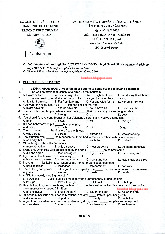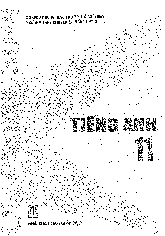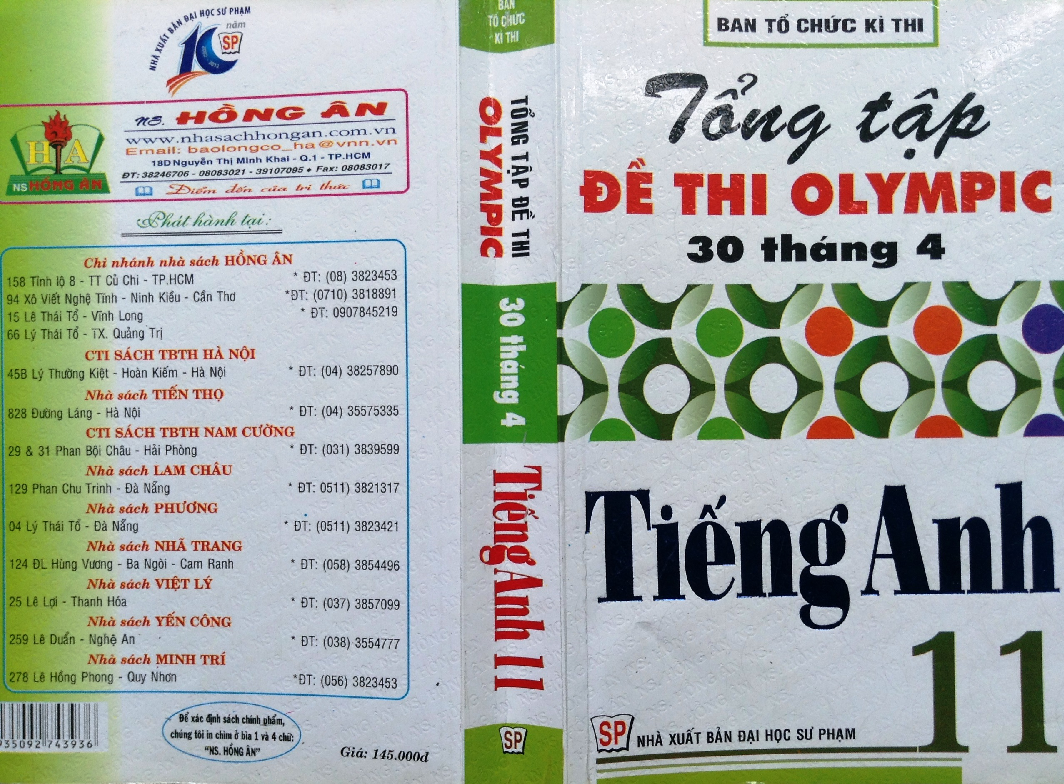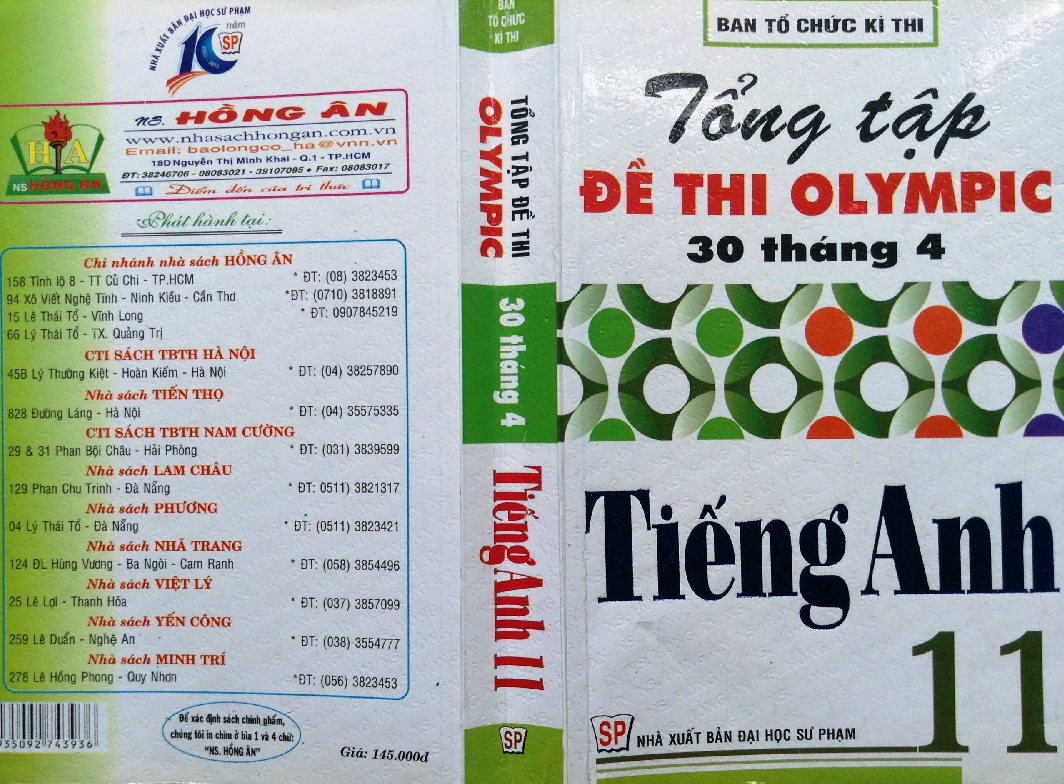











Preview text:
BỘ GIÁO DỤC VÀ ĐÀO TẠO
THI OLYMPIC “TRẠI HÈ PHƯƠNG NAM”
LẦN THỨ I - NĂM 2014 ĐỀ CHÍNH THỨC
ĐỀ THI MÔN: TIẾNG ANH
(Đề thi gồm có 12 trang) Ngày thi: 30/7/2014
Thời gian làm bài: 120 phút (không kể thời gian phát đề) Viết đoạn văn
Em hiểu ý nghĩa của câu dưới đây như thế nào? Em có đồng ý với ý nghĩa của câu không?
“It is better to be hated for what you are than to be loved for
what you are not.”
Hãy viết một đoạn văn bằng tiếng Anh (khoảng 150 từ) về cách hiểu của em và ý kiến của
em có đống ý với ý nghĩa của câu đó không vào giấy thi. 1 STT do giám thị ghi
Họ và tên thí sinh: _________________________
Giám thị 1: ______________________
Số báo danh: ________________Phòng thi _____
Giám thị 2: ______________________ Số phách
Học sinh lớp _____ trường___________________ (Do CT HĐ chấm thi ghi)
(Ký tên - Ghi họ và tên)
----------------------------------------------------------------------------------------------------- Điểm từng phần Điểm bài thi Họ tên và chữ ký Số phách Bằng số Bằng chữ Giám khảo 1 Giám khảo 2 .......................... .......................... .......................... STT do CT HĐ .......................... chấm thi ghi Tổng:.............. NGHE HIỂU
Trong phần này em sẽ nghe một Giáo sư nói về nội dung bài tập học sinh phải làm khi
tham dự môn học của giáo sư. Nghe và điền vào chỗ trống những từ còn thiếu (1-5). Em
viết câu trả lời vào các ô trống có đánh số cho ở phía dưới bài.
Your test on Friday will cover material from both of your textbooks, my lecture notes, and
your lab assignments. There will be (1) …………. multiple-choice questions and five short
answer essay questions. The multiple-choice questions will count half of your grade and the
essay questions will count half of your grade.
I will tell you right now that there won’t be any (2) …….. problems, but that doesn’t mean
that you shouldn’t review the (3) ……. and know what they are used for.
I wouldn’t bother much with the notes from my first lecture since that was an (4) …….of the
course, but you’ll probably want to look at them when you study for the final.
Oh yes, this test represents twenty-five percent of your total grade for the semester. The lab
reports are twenty-five percent, attendance ten, and your final (5) ……… .
Em viết câu trả lời vào đây 1. ……………. 2………………. 3. ……………. 4. …………… 5. …………….
Trong phần này em sẽ nghe một đoạn trong bài giảng khác của Giáo sư. Nghe và trả lời
các câu hỏi (6-10) bằng cách chọn một phương án trả lời đúng nhất A, B, C, hoặc D trong
các phương án cho sẵn. Em viết câu trả lời vào các ô trống có đánh số cho ở phía dưới bài.
6. What is the main subject of this lecture? A. Heredity B. Environment C. Birth order D. Motivation 2
7: What should the students know before they hear this lecture?
A. Birth order may influence personality.
B. Heredity and environment play a role in the development of the personality.
C. There is research on birth order at the University of Texas at Arlington.
D. Firstborn children and only children have similar personalities.
8: Which one of the people would probably be the most comfortable interacting with a member of the opposite sex?
A. A man with younger sisters. B. A man with older sisters.
C. A woman with younger sisters.
D. A woman with older sisters.
9: What personality trait will first born children probably exhibit? A. Likable B. Ambitious C. Sociable D. Talkative
10: According to the research, what might be the dominant personality of trait of the youngest child? A. Charming B. Shy C. Motivated D. Happy
Em viết câu trả lời vào đây 6. ………….. 7. ………….. 8. …………. 9. ………….. 10. …………
NGỮ ÂM, NGỮ PHÁP VÀ TỪ VỰNG
Em hãy đánh trọng âm vào các âm tiết có trọng âm trong các từ sau (11-15). Ví dụ: compen'sation 11. legality 12. judgemental 13. eligibility 14. criminology 15. defendant
Em hãy chọn một câu trả lời đúng nhất A, B, C hoặc D đtrong các phương án cho sẵn để
hoàn thành các câu sau (16-25). Em viết câu trả lời vào các ô trống có đánh số cho ở phía dưới bài. 3
16. Foreign trade in our country has ……………. in recent years. A. extended B. expanded C. exploited D. widened.
17. A tourist is prevented from entering another country if he doesn’t have a (an) ……..passport. A. cooperative B. effective C. valid D. efficient
18. Social morality is ………and difficult to define; it involves not only man’s intelligence
but his feelings and his total being. A. imaginative B. illogical C. irrational D. illusive
19. If the meaning of the psaage is stil …….to you after my explanation, you may consult this reference book. A. dark B. dim C. obscure D. indistinguishable
20. When I said goodbye to her, she ……….the door.
21. Among the materials used ------ reeds and straw. A. to making thatched roofs
B. to make thatched roofs were
C. for making the thatched roofs D. were thatched roofs made
22: _______ air is composed of about 78 percent nitrogen and only about 21 percent oxygen,
is a little known fact on the streets. A. How that B. That C. When D. However
23: A gifted scientist, Newton _______ some of the most fundamental laws in the history of science. A. keeps discovering B. who discovered C. the discoverer of D. discovered
24: Over time the young students will perfect the art of piano playing. After all, such
________ needs delicate handling. A. a tuned instrument finely B. an instrument tuned finely C. a finely instrument tuned D. a finely tuned instrument
25: The process uses an innovative digital technology __________ the products with as many colors as the image contains. A. imprints B. that imprints it C. that imprints D. that it imprints
Em viết câu trả lời vào đây 16…………….. 17. ………….. 18. ………….. 19. …………… 20…………. 21. ………… 22. ………… 23. ………….. 24………….. 25…………. 4 STT do giám thị ghi
Họ và tên thí sinh: _________________________
Giám thị 1: ______________________
Số báo danh: ________________Phòng thi _____
Giám thị 2: ______________________ Số phách
Học sinh lớp _____ trường___________________ (Do CT HĐ chấm thi ghi)
(Ký tên - Ghi họ và tên)
----------------------------------------------------------------------------------------------------- Điểm từng phần Điểm bài thi Họ tên và chữ ký Số phách Bằng số Bằng chữ Giám khảo 1 Giám khảo 2 .......................... .......................... .......................... STT do CT HĐ .......................... chấm thi ghi Tổng:..............
Một số dòng trong đoạn văn sau có một từ thừa. Em hãy tìm ra từ đó và viết vào ô trống
bên tay phải (26-35). Em viết câu trả lời vào ô trống có đánh số bên phải. Câu nào không
có từ thừa em đánh dấu (√).
Our cities and towns are far from silent at the night. As most of us are 26..……………
going to bed, a battalion of workers is just stirring into action. 27..………..…..
It is being estimated that up to a fifth of the working population carries out 28……………..
its duties at night – running hospitals and maintaining up power stations, 29…….………. for
example. There is one problem: they have the same as biological clock 30…..…………
as day workers. Night workers often have trouble sleeping through the 31….………….
day, and sometimes find it harder than to stay awake on their shift, 32……..………
which means mistakes are more likely to happen. Dr Lawrence Smith, a 33……………..
psychologist, discovered that among peoplewho just carry out the 34……….…….
same job, night workers suffered 20% more injuries than their day workers. 35……………..
Em hãy hoàn thành những câu sau (36-40) với một giới từ (preposition) hoặc một tiểu từ
(particle) phù hợp. Em viết câu trả lời vào ô trống có đánh số phía dưới bài.
36.Hary had to set …….at dawn to catch the early train.
37. Sue’s bike passed me, and I had to ride fast to catch …….with her.
38. We were making …….Paris, but we were not in a hurry to get there.
39. Paul enjoyed camping, but couldn’t put up …… the insects!
40. When we realized we had forgotten our passports, we turned ………….
Em viết câu trả lời vào đây
36………….…… 37. …………
38..………..…… 39.…………..…. 40 ………..…. 5
Em hãy hoàn thành các câu (41-50) trong đoạn văn sau bằng cách viết đúng dạng ngữ
pháp của từ in đậm trong ngoặc. Em viết câu trả lời vào những ô trống có đánh số ở phía dưới.
Just how (41- READ) should a popular science book be? This may seem an odd question, but
there is an important issue at stake here. This was made clear at the Aventis Science Book
Awards, when jury chairman Lewis Wolpert (42- PASSION) espoused the cause for making
the genre more demanding of readers. The biologist believes too many science writers are
now running scared of (43- COMPLEX). As he points out, the public does not expect great
(44- LITERATE) figures like James Jouyce or T. S. Eliot to be easy to follow. Indeed,
readers positively relish their intricate styles. So why then do we not have such (45-
EXPECT) of science writers?
Wolpert’s belief is (46- EXAMPLE) by his jury’s choice of winner – Brian Greene’s long,
dense and extremely technical The Elegant Universe, a singularly (47- COMPROMISE)
treatise on cosmology. But how far should one go down this route? Although (48-
ELEGANCE) written, the book is so dense and opaque that it pushes the notion of popular
science writing close to the precipice of (49- COMPREHEND) and leaves one fearful that it
will only daunt, rather than attract (50- INITIATE) .
Em viết câu trả lời vào đây
41. ………….. 42. …………….. 43…………….… 44……..………. 45………………
46…………… 47…………….... 48…………….… 49……..………. 50………….…..
Em hãy tìm một từ thích hợp điền vào mỗi ô trống trong đoạn văn sau (51- 60). Em viết câu
trả lời vào các ô trống có đánh số ohias dưới bài.
Have you ever wondered what people generally fo for in a painting? In 1993, two artists set
(51 ….) to discover what America’s favourite painting looked (52 …..) . They hired telephone
researchers to call 1, 001 Americans (53 ….) all backgrounds and ask them a list of questions.
What sort of paintings do you like? Which colours do you prefer? There were 102 questions (54 …) all.
Once equipped with (55 …..) information, the artists, Vitaly Komar and Alexander Melamid,
set to (56….) to create two paintings – America’s Most Wanted, and America’s Most
Unwanted. Eighty-eight percent of people questioned wanted (57….) landscape. Favourite colours were blue and green. 6
America’s Most Unwanted, (58 …..) contrast, aimed to displease. It was ‘different looking’,
featured gold, orange, peach and teal, (59 …..) was very modern. But this was (60….) the
start of the artists’ scientific guide to taste. Komar and Melamid went on to do similar surveys
for another nine countries. Disturbingly, many of the respondents in these countries wanted
landscapes similar to the one American had chosen.
Em viết câu trả lời vào đây 51…………..….
52 …………….. 53.
54. …….……… 55. ………..….. ……………..
56. …………….. 57. ………..….. 58.
59. ……….…… 60. ………….... ………….…. 7 STT do giám thị ghi
Họ và tên thí sinh: _________________________
Giám thị 1: ______________________
Số báo danh: ________________Phòng thi _____
Giám thị 2: ______________________ Số phách
Học sinh lớp _____ trường___________________ (Do CT HĐ chấm thi ghi)
(Ký tên - Ghi họ và tên)
----------------------------------------------------------------------------------------------------- Điểm từng phần Điểm bài thi Họ tên và chữ ký Số phách Bằng số Bằng chữ Giám khảo 1 Giám khảo 2 .......................... .......................... .......................... STT do CT HĐ .......................... chấm thi ghi Tổng:.............. ĐỌC HIỂU
Em hãy đọc bài văn dưới đây. Chọn một từ đúng nhất, A, B, C, hoặc D để điền vào mỗi ô
trống có đánh số (61-70). Em viết câu trả lời vào các ô trông cho sẵn ở dưới bài.
It’s not just budding young entrepreneurs who start up new businesses. Fifty-year-old Jane
Owers, from London, has left her job in education to make her (61…..) as a florist. Jane
believes she (62 ….) a better chance of success than someone half her age, as she has life
experience and financial collateral in the form of (63…..). As she explains, ‘It’s often the fear
of financial failure that (64 ….) others from starting up on their own. With me, it was more of
a (65 ….) risk. If the worst (66 ….) to the worst, I can always (67…..) losses and return to my
previous profession. Hopefully, though, that’s just a worst-case (68 ….).
Jane’s business plan was a modest one. Her bank manager was (69 ….) over by her realistic
outlook and convinced that with Jane there would be no rash or self-indulgent spending (70
….). As a result he was happy to loan her the money she needed. 61. A mark B stamp C niche D sign 62. A represents B supports C holds D stands 63. A poverty B property C currency D cash 64. A deters B avoids C curbs D cautions 65. A figured B calculated C weighed D gauged 66. A gets B takes C comes D puts 67. A cut B count C let D lift 68. A situation B eventuality C occurrence D scenario 69. A won B charmed C swept D caught 70. A binges B sprees C revels D feasts 8
Em viết câu trả lời vào đây 61. …………… 62…………..… 63……………... 64………..……. 65……………
66……………... 67……………... 68……………… 69……………… 70……………
Em hãy đọc đoạn văn dưới đây và trả lời các câu hỏi (71-80) bằng cách chọn một câu trả
lời đúng nhất A, B, C hoặc D theo nội dung của bài. Em viết câu trả lời vào các ô trống cos
đánh số ở phần dưới bài. . 1
Most languages have several levels of vocabulary that may be 2
used by the same speakers. In English, at least three have been 3 identified and described. 4
Standard usage includes those words and expressions understood, 5
used, and accepted by a majority of the speakers of a language in any 6
situation regardless of the level of formality. As such, these words 7
and expressions are well defined and listed in standard dictionaries. 8
Colloquialisms, on the other hand, are familiar words and idioms that 9
are understood by almost all speakers of a language and used in 10
informal speech or writing, but not considered acceptable for more 11
formal situations. Almost all idiomatic expressions are colloquial 12
language. Slang, however, refers to words and expressions 13
understood by a large number of speakers but not accepted as 14
appropriate formal usage by the majority. Colloquial expressions and 15
even slang may be found in standard dictionaries but will be so 16
identified. Both colloquial usage and slang are more common in 17 speech than in writing. 18
Colloquial speech often passes into standard speech. Some slang 19
also passes into standard speech, but other slang expressions enjoy 20
momentary popularity followed by obscurity. In some cases, the 21
majority never accepts certain slang phrases but nevertheless retains 22
them in their collective memories. Every generation seems to require 23
its own set of words to describe familiar objects and events. 24
It has been pointed out by a number of linguists that three 25
cultural conditions are necessary for the creation of a large body of 26
slang expressions. First, the introduction and acceptance of new 9 27
objects and situations in the society; second, a diverse population 28
with a large number of subgroups; third, association among the 29
subgroups and the majority population. 30
Finally, it is worth noting that the terms ‘standard,’ ‘colloquial,’ 31
and ‘slang’ exist only as abstract labels for scholars who study 32
language. Only a tiny number of the speakers of any language will 33
be aware that they are using colloquial or slang expressions. Most 34
speakers of English will, during appropriate situations, select and use 35
all three types of expressions. Questions
71. Which of the following is the main topic of the passage? A. Standard speech B. Idiomatic phrases
C. Different types of vocabulary D. Dictionary usage
72. How is slang defined by the author?
A. Words and phrases accepted by the majority for formal usage.
B. Words and phrases understood by the majority but not found in standard dictionaries.
C. Words and phrases that are understood by a restricted group of speakers.
D. Words and phrases understood by a large number of speakers but not accepted as formal usage.
73. The word ‘obscurity’ in line 20 could best be replaced by A. disappearance B. influence C. qualification D. tolerance
74. The word ‘appropriate’ in line 14 is closest in meaning to A. old B. large C. correct D. important
75. The word ‘them’ in line 22 refers to A. words B. slang phrases C. memories D. the majority
76. Where in the passage does the author explain where colloquial language and slang are most commonly used? A. Lines 4-6 B. Lines 16-17 B. Lines 24-26 D. Lines 33-35
77. What does the author mean by the statement in line 8-11” “Colloquialisms, on the other
hand, are familiar words and idioms that are understood by almost all speakers of a language
and used in informal speech or writing, but not considered acceptable for more formal situations”?
A. Familiar words and phrases are found in both speech and writing in formal settings.
B. Familiar situations that are experienced by most people are called colloquialisms. 10
C. Informal language contains colloquialisms, which are not found in more formal language.
D. Most of the speakers of a language can use both formal and informal speech in appropriate situations.
78. Which of the following is true of standard usage?
A. It can be used in formal and informal settings.
B. It is limited to written language.
C. It is only understood by the upper classes. D. It is constantly changing.
79. The author mentions all of the following as requirements for slang expressions to be created EXCEPT A. new situations B. a new generation
C. interaction among diverse groups D. a number of linguists
80. It can be inferred from the passage that the author
A. does not approve of either slang or colloquial speech in any situation.
B. approves of colloquial speech in some situations, but not slang
C. approves of slang and colloquial speech in appropriate situations
D. does not approve of colloquial usage in writing.
Em viết câu trả lời vào đây 71. 72. 73 74. 75. 76. 77. 78. 79. 80. WRITING
Em hãy hoàn thành các câu sau (81-85) với các từ/ cụm từ cho sẵn sao cho nghĩa của câu
không thay đổi so với nghĩa của câu trước nó. Em viết tiếp câu vào phần trống.
81. They’ll arrive soon.
It ………………………………………………………………………………………………
82. Let’s go home at the end of the second act.
As soon as ……………………………………………………………………………………
83. This will be the group’s first concert in the Ho Chi Minh City.
This will be the first time …………………………………………………………………….
84. There is a rumour that the rebels shot down the aircraft MH 17.
It …………………………………………………………………………………………….
85. Fancy you and I meeting in the middle of Africa like this !
It’s really odd …………………………………………………………………………….. 11
Em hãy hoàn thành các câu sau (86-90) sao cho câu có nghĩa tương tự với nghĩa của câu
trước nó, sử dụng từ cho sẵn in đậm. Không thay đổi dạng thức từ cho trước. Em viết vào
phần u để trống trong mỗi câu.
86. Huong and I have been friends since 2008. dates
My …………………………………………………………………….. to 2008.
87. ‘It wasn’t my fault that the window got broken,’ Gary said. responsibility
Gary denied ………………………………………………………………… the window.
88. My grandmother has finally got used to living alone. terms
My grandmother ……………………………………………………………. living alone.
89. I am not expecting an increase in summer sales this year. upturn
I have ………………………………………………………………. in summer sales this year.
90. The students were told to either keep quiet or leave the art gallery. no
The students ………………………………………………. keep quiet or leave the art gallery. 12




